Commercial HVAC Nottage
Top 10 Business HVAC in Nottage
Receive multiple Business HVAC quotes for your project today! Compare profiles, reviews, accreditations, portfolio, etc... and choose the best service.

H2O Heating and gas services ltd
4.845 reviewsY Garth Capel Seion Road, Drefach, SA14 7BN, GBWe provide quality heating services across South West Wales and the surrounding areas. If you require cost effective, reliable heating and plumbing engineers then look no further. We cater to all domestic and business customer's central heating systems, gas & oil services and plumbing requirements. We have the knowledge and expertise needed to ensure that you receive nothing but the best service. Our reputation has been developed through hard work and reliability which is why we are the area's number one choice for gas, oil and plumbing related work. We are a Worcester Accredited Installer Worcester Accredited installers are recognised domestic and commercial heating companies that meet or exceed the standards of sustained quality of installation, service and customer care. These installers are accessible, through the official Worcester Bosch website. Worcester Bosch ensure our clients receive a high standard of workmanship and professionalism, our accredited companies are monitored by several recognised trade and industry bodies. To ensure our customers receive a high standard of workmanship and professionalism our company is accredited and monitored by several trade and industry bodies. We offer you the highest quality workmanship and services
- Services
- Why Us?
- Accreditations
- Gallery
Get Quote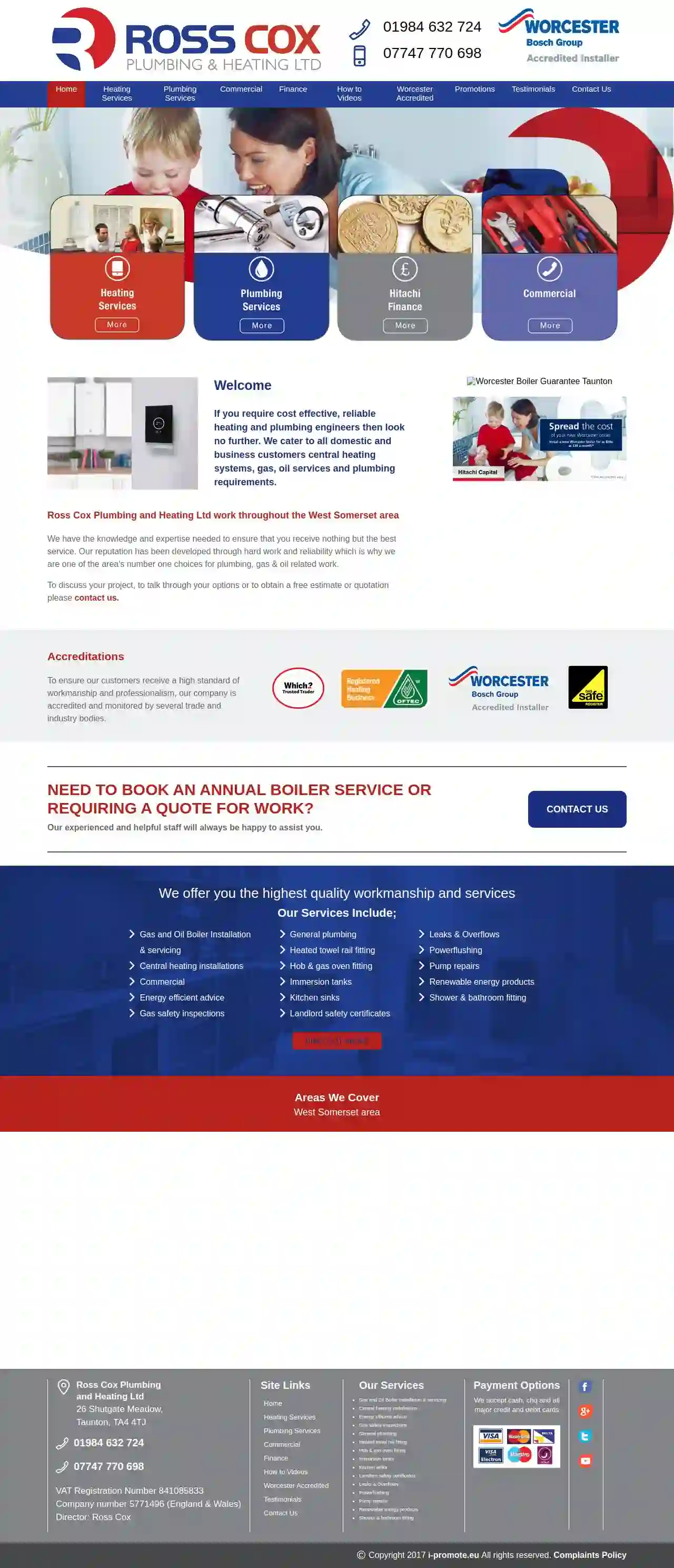
Ross Cox Plumbing and Heating Ltd
37 reviews26 Shutgate Meadow, Williton, Taunton, TA4 4TJ, GBIf you require cost effective, reliable heating and plumbing engineers then look no further. We cater to all domestic and business customers central heating systems, gas, oil services and plumbing requirements. Ross Cox Plumbing and Heating Ltd work throughout the West Somerset area. We have the knowledge and expertise needed to ensure that you receive nothing but the best service. Our reputation has been developed through hard work and reliability which is why we are one of the area's number one choices for plumbing, gas & oil related work. To discuss your project, to talk through your options or to obtain a free estimate or quotation please contact us. To ensure our customers receive a high standard of workmanship and professionalism, our company is accredited and monitored by several trade and industry bodies. NEED TO BOOK AN ANNUAL BOILER SERVICE OR REQUIRING A QUOTE FOR WORK? Our experienced and helpful staff will always be happy to assist you.
- Services
- Why Us?
- Accreditations
- Our Team
- Testimonials
- Gallery
Get Quote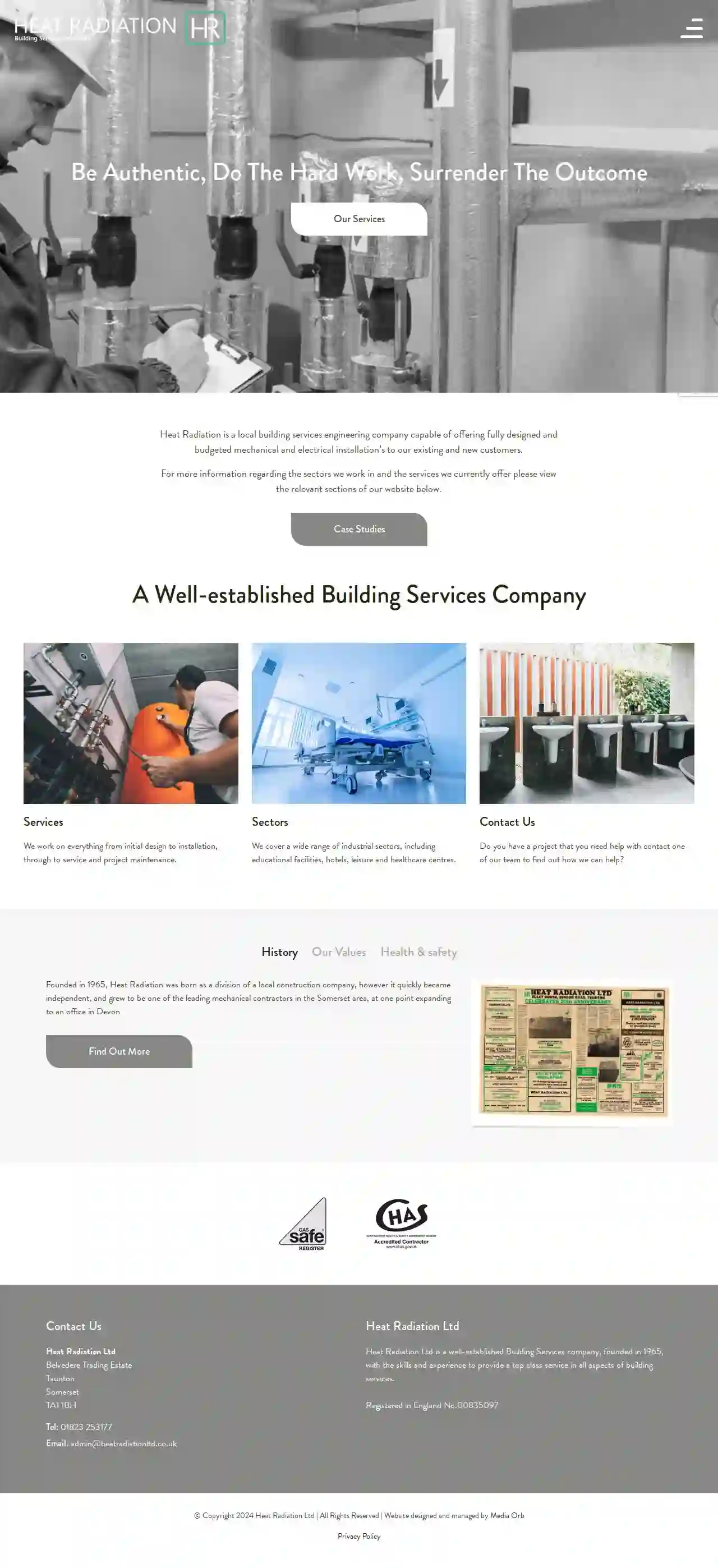
Heat Radiation Ltd
51 reviewsBelvedere Trading Estate, Taunton, TA1 1BH, GBBe Authentic, Do The Hard Work, Surrender The Outcome. Our Services. Heat Radiation is a local building services engineering company capable of offering fully designed and budgeted mechanical and electrical installation’s to our existing and new customers. For more information regarding the sectors we work in and the services we currently offer please view the relevant sections of our website below. Case Studies. A Well-established Building Services Company. Services. We work on everything from initial design to installation, through to service and project maintenance. Sectors. We cover a wide range of industrial sectors, including educational facilities, hotels, leisure and healthcare centres. Contact Us. Do you have a project that you need help with contact one of our team to find out how we can help? History. Our Values. Health & safety. Founded in 1965, Heat Radiation was born as a division of a local construction company, however it quickly became independent, and grew to be one of the leading mechanical contractors in the Somerset area, at one point expanding to an office in Devon. Find Out More. As a company, and as individuals, we are highly motivated, competent, and strive to offer buildable, cost effective and energy efficient solutions to our clients needs, ensuring a smooth transition from design stage, all the way through project handover and beyond. Find Out More. All our site operatives hold a minimum CSCS status with the majority having IPAF, PASMA and NEBOSH training. We regularly enrol them on relevant training courses that are relevant to site and task specific risk assessments. Find Out More.
- Services
- Why Us?
- Our Team
- Gallery
Get Quote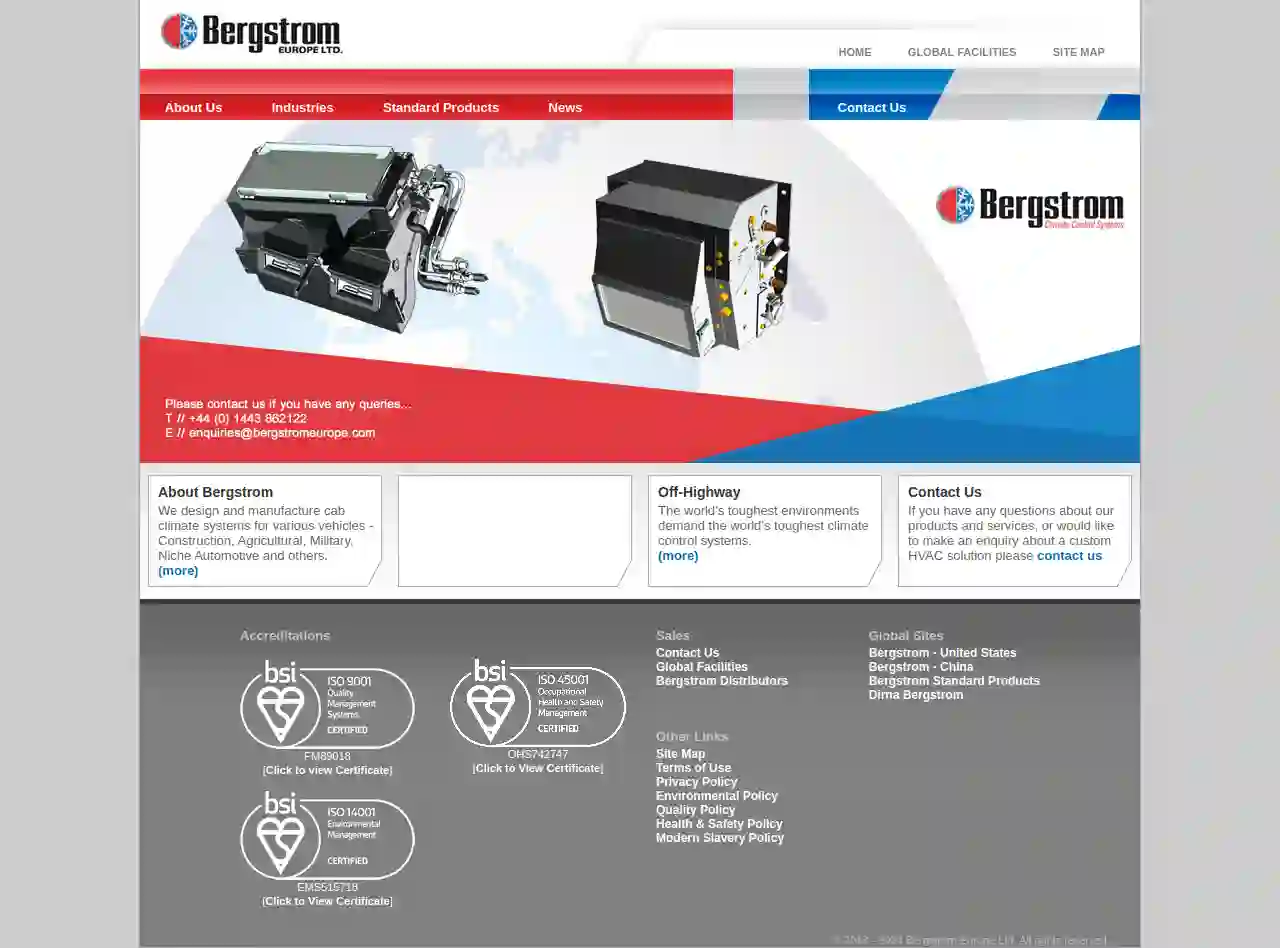
Bergstrom Europe
4.414 reviewsPontypridd, GB- Services
- Why Us?
- Gallery
Get Quote
RDB Eco Heat
55 reviewsUnit 1, Neath Industrial Estate, Neath, SA10 8AA, GBRDB ECO Heat is a company that has been providing sustainable heating and plumbing solutions in Swansea since 2000. They are committed to customer satisfaction and offer a range of services for both residential and commercial properties. As pioneers in eco-friendly alternatives, they specialize in new build projects and strive to lead the way towards a greener future. With over 22 years of experience, RDB ECO Heat has built a reputation for excellence in the industry.
- Services
- Why Us?
- Gallery
Get Quote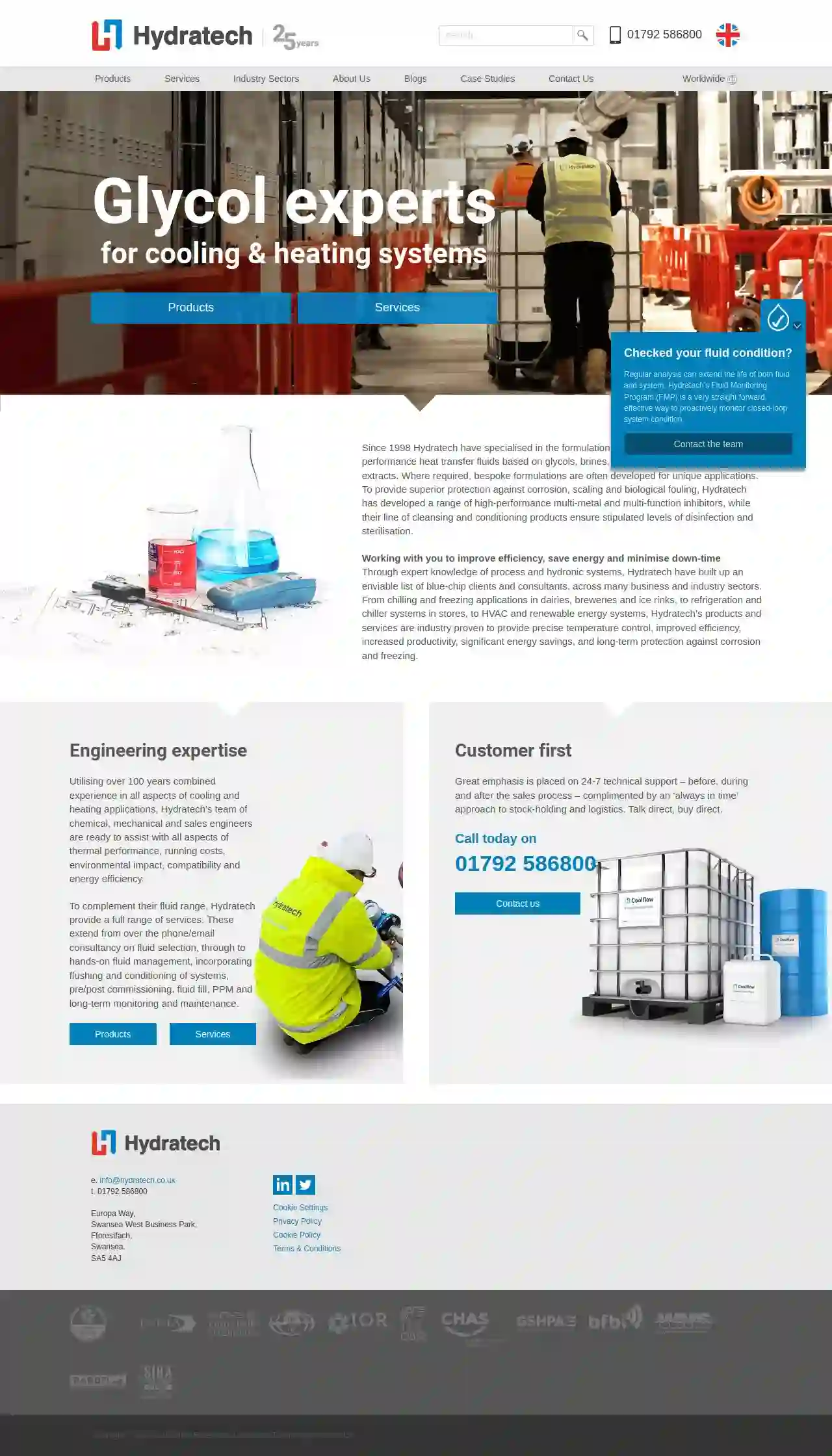
Hydratech
51 reviewsSwansea West Business Park, Fforestfach, Unit 5 Europa Way, Swansea, SA5 4AJ, GBHydratech specialise in the manufacture of heat transfer fluids, glycols, antifreeze solutions, inhibitors and cleansers - for use in cooling and heating systems across all sectors. To complement their market-leading products, Hydratech’s team of experienced, highly skilled engineers provide 24-7 technical support across the UK, ensuring compliance and peace of mind for your commercial, industrial or process systems.
- Services
- Why Us?
- Gallery
Get Quote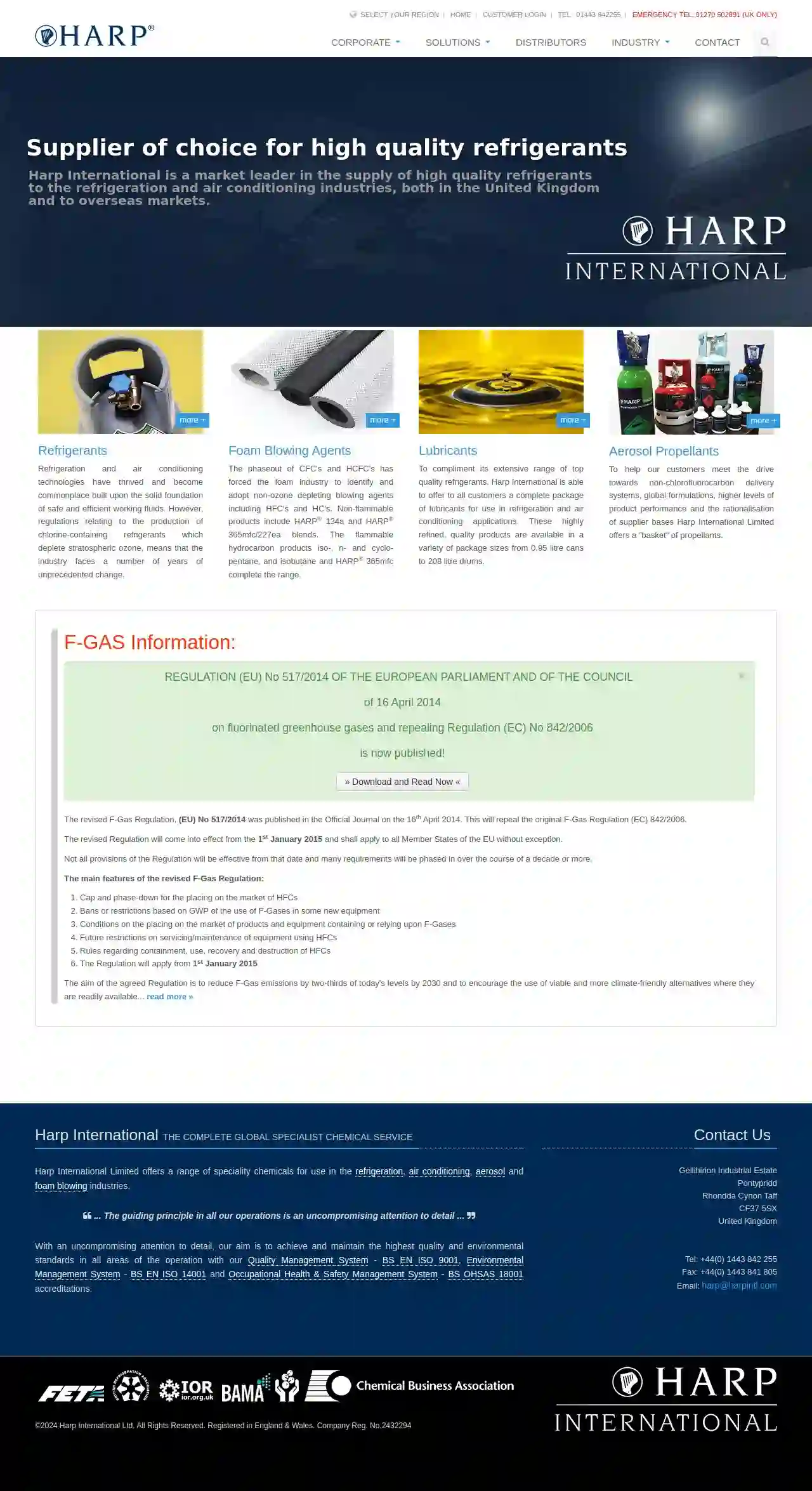
Harp International Ltd
3.917 reviewsPontypridd, Rhondda Cynon Taff, Gellihirion Industrial Estate, CF37 5SX, GBHarp International is a market leader in the supply of high quality refrigerants to the refrigeration and air conditioning industries, both in the United Kingdom and to overseas markets. With an uncompromising attention to detail, our aim is to achieve and maintain the highest quality and environmental standards in all areas of the operation with our Quality Management System - BS EN ISO 9001, Environmental Management System - BS EN ISO 14001 and Occupational Health & Safety Management System - BS OHSAS 18001 accreditations.
- Services
- Why Us?
- Accreditations
- Gallery
Get Quote
Laver Group
4.3225 reviewsNile Road, Riverside Buildings, Pontypridd, CF37 1BW, GBLaver Group Ltd is a low carbon installer that helps domestic, public, and private sector clients meet their obligations and deliver on their goals. We're a professional and friendly team that provides excellent service, employing quality people, and a dedication to innovation and value engineering. Our mission is to be a distinguished, innovative and a socially responsible heat care provider. We take complaints about our work, staff and levels of service very seriously and have a formal complaints procedure in place. We're committed to sustainability in construction and integrate socially responsible behaviour into our core values.
- Services
- Why Us?
- Accreditations
- Our Team
- Testimonials
- Gallery
Get Quote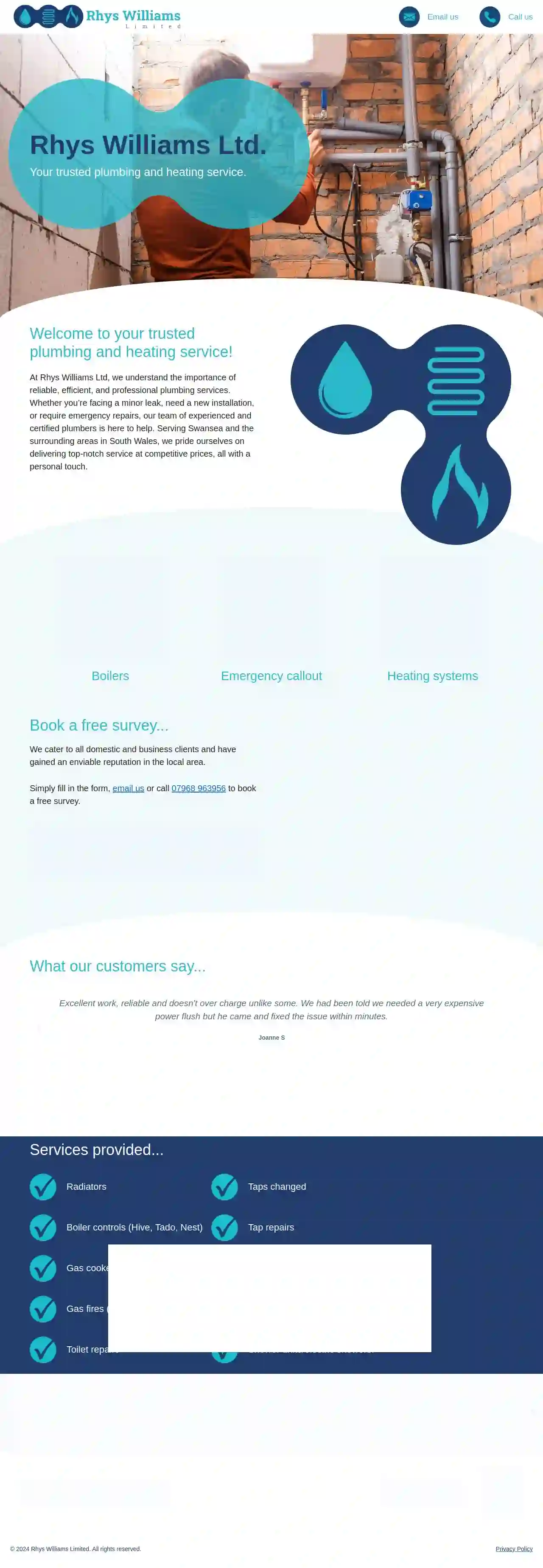
Rhys Williams Ltd
3.73 reviewsSwansea, SA1, GBWelcome to your trusted plumbing and heating service! At Rhys Williams Ltd, we understand the importance of reliable, efficient, and professional plumbing services. Whether you’re facing a minor leak, need a new installation, or require emergency repairs, our team of experienced and certified plumbers is here to help. Serving Swansea and the surrounding areas in South Wales, we pride ourselves on delivering top-notch service at competitive prices, all with a personal touch. We cater to all domestic and business clients and have gained an enviable reputation in the local area. Simply fill in the form, email us or call 07968 963956 to book a free survey.
- Services
- Why Us?
- Accreditations
- Our Team
- Testimonials
- Gallery
Get Quote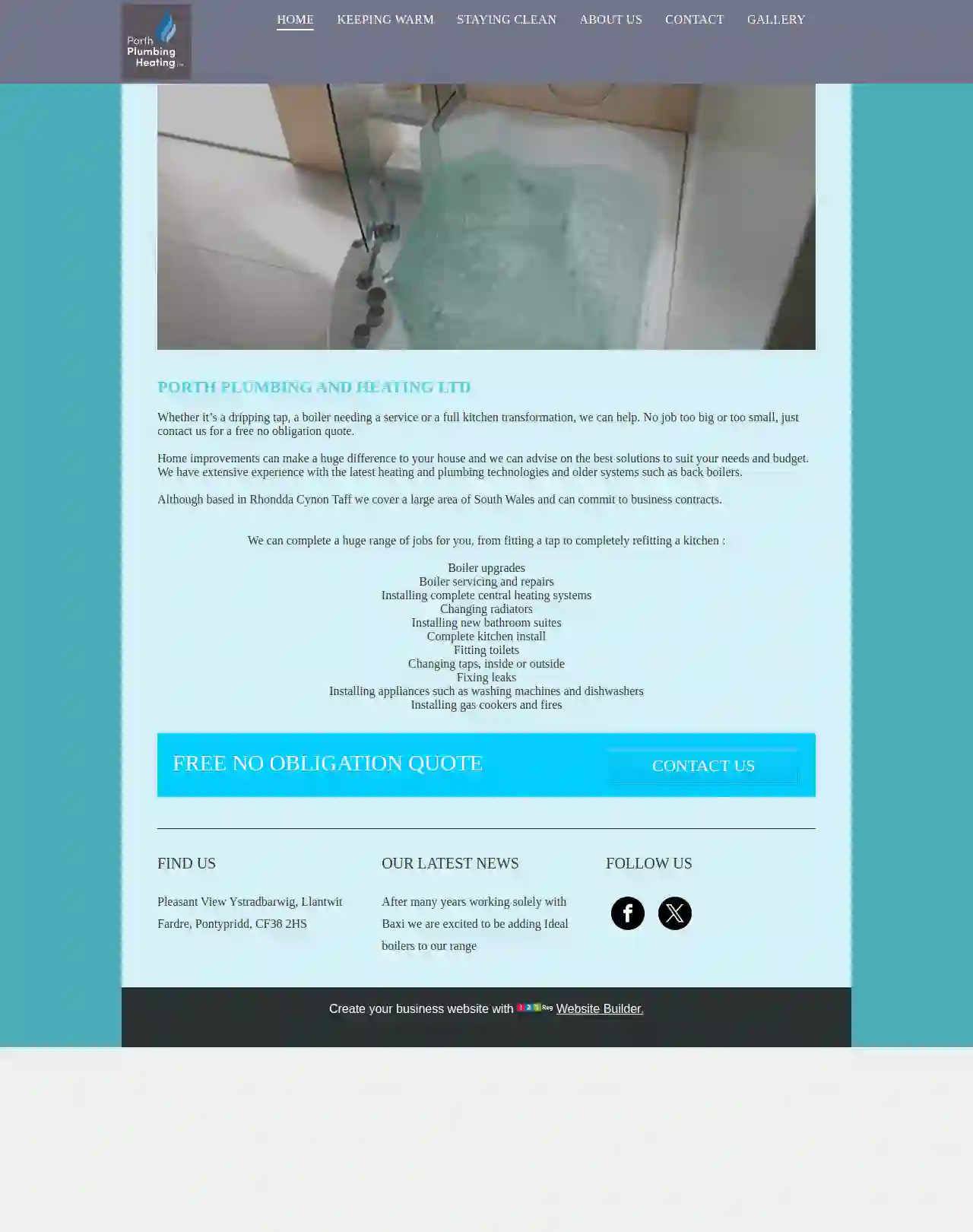
Porth Plumbing & Heating Ltd
515 reviewsYstradbarwig, Llantwit Fardre, Pleasant View, Pontypridd, CF38 2HS, GBPORTH PLUMBING AND HEATING LTD is a family business with over 30 years of experience serving the valleys and surrounding areas. We pride ourselves on customer satisfaction, with a lot of our work coming from recommendations. Whether it's a dripping tap, a boiler needing a service, or a full kitchen transformation, we can help. No job is too big or too small. We offer free, no-obligation quotes and can advise on the best solutions to suit your needs and budget. We have extensive experience with the latest heating and plumbing technologies, as well as older systems like back boilers. Although based in Rhondda Cynon Taff, we cover a large area of South Wales and can commit to business contracts. Our team can complete a wide range of jobs, from fitting a tap to completely refitting a kitchen. We offer services such as: Boiler upgrades Boiler servicing and repairs Installing complete central heating systems Changing radiators Installing new bathroom suites Complete kitchen installs Fitting toilets Changing taps, inside or outside Fixing leaks Installing appliances such as washing machines and dishwashers Installing gas cookers and fires
- Services
- Why Us?
- Accreditations
- Gallery
Get Quote
Over 12,692+ HVAC Businesses registered
Our HVAC companies operate in Nottage and beyond!
HVACCompaniesHub has curated and vetted the Best HVAC Contractors arround Nottage. Find the most reliable pro today.
Frequently Asked Questions about Commercial HVAC
- Building Size and Type: Larger or specialized buildings (restaurants, labs) have more complex requirements.
- System Type and Capacity: Different HVAC systems (e.g., rooftop units, VRF systems) have varying costs.
- Efficiency: Higher-efficiency units typically have a higher initial cost.
- Installation Complexity: Ductwork, electrical wiring, and other installation factors influence the final price.
- Location: Labor costs and local regulations can affect pricing.
- Upgrade to High-Efficiency Equipment: Invest in energy-efficient HVAC equipment.
- Optimize Thermostat Settings: Use a programmable or smart thermostat to control temperatures and reduce HVAC usage.
- Regular Maintenance: Schedule preventative maintenance to keep the system operating at its best.
- Seal Air Leaks and Improve Insulation: Prevent drafts and uncontrolled airflow.
- HVAC Zoning: Implement zoning with individual temperature controls.
- Regularly Clean or Replace Air Filters: Keep air filters clean to improve airflow and energy efficiency.
- Ventilation: Implement ventilation strategies to minimize the amount of outside air that needs conditioning.
- Employee Awareness: Encourage energy-saving practices among your employees, such as turning off lights and equipment when not in use.
What is a chiller, and how does it work?
How much does a commercial HVAC system cost?
What is commercial HVAC?
How can I save money on commercial HVAC costs?
What is a chiller, and how does it work?
How much does a commercial HVAC system cost?
- Building Size and Type: Larger or specialized buildings (restaurants, labs) have more complex requirements.
- System Type and Capacity: Different HVAC systems (e.g., rooftop units, VRF systems) have varying costs.
- Efficiency: Higher-efficiency units typically have a higher initial cost.
- Installation Complexity: Ductwork, electrical wiring, and other installation factors influence the final price.
- Location: Labor costs and local regulations can affect pricing.
What is commercial HVAC?
How can I save money on commercial HVAC costs?
- Upgrade to High-Efficiency Equipment: Invest in high-SEER and -AFUE rated HVAC equipment.
- Optimize Thermostat Settings: Use a programmable or smart thermostat to schedule temperature changes and minimize energy waste.
- Regular Maintenance: Schedule preventative maintenance to keep the system operating at its best.
- Seal Air Leaks and Improve Insulation: Ensure proper insulation in the building envelope and seal any air leaks.
- HVAC Zoning: Divide your building into separate zones with dedicated temperature controls.
- Regularly Clean or Replace Air Filters: Keep air filters clean to improve airflow and energy efficiency.
- Ventilation: Implement demand-controlled ventilation to minimize the amount of outside air that needs conditioning.
- Employee Awareness: Encourage energy-saving practices among your employees, such as turning off lights and equipment when not in use.